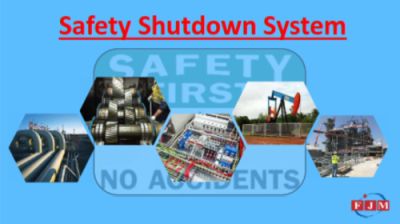
- This event has passed.
Safety Shutdown System

BACKGROUND:
Safety Shutdown Systems (SSS) are critical in ensuring the safe operation of industrial plants, machinery, and equipment. These systems are designed to automatically detect hazardous conditions and initiate a controlled shutdown to prevent accidents, equipment damage, or catastrophic failures. In industries such as oil and gas, manufacturing, and power generation, where processes often operate at high temperatures, pressures, and other dangerous conditions, a reliable safety shutdown system is essential. This training focuses on providing participants with the knowledge and skills required to understand the components, design, and operation of safety shutdown systems, ensuring they are well-equipped to maintain and troubleshoot such systems effectively.
The three-day training program will provide a comprehensive overview of safety shutdown system principles, including system architecture, detection methods, and shutdown protocols. Participants will gain practical knowledge of the key components such as sensors, controllers, and actuators that are integral to these systems. The course will also cover the importance of regular maintenance, testing, and calibration to ensure the system’s reliability during emergencies. By the end of the training, participants will be equipped with the skills to implement, maintain, and troubleshoot Safety Shutdown Systems in various industrial applications, contributing to a safer working environment.
OBJECTIVES:
- Understanding the Fundamentals
- System Design and Functionality
- Component Knowledge
- Maintenance and Calibration
- Troubleshooting and Problem-Solving
- Enhancing Workplace Safety
RECOMMENDED PARTICIPANTS:
- Control Room Operators
- Maintenance Technicians
- Process Engineers
- Electrical and Instrumentation Engineers
- Safety Officers
- Project Engineers/Managers
- Plant Operators
- Quality Assurance Personnel
COURSE OUTLINE:
- Introduction to hazards and risks
- Safety systems engineering
- Standards
- Safety Life Cycle (SLC)
- Hazards and Risks Reduction
- Process control vs Safety control
- Safety Integrity Level (SIL)
- Risk analysis and reduction
- Safety Instrumented Systems (SIS)
- HAZOP
- Safety requirement specifications
- Technology choices and conceptual design
- Reliability in safety systems
- Field instruments and devices
- Hardware & software
- Overall process
- Management of change
- Justification
ABOUT THE COURSE LEADER:
Prof. Ir. Endra Joelianto, Ph.D., SMIEEE is an expert in control engineering. His outstanding research is: Hybrid Control Systems, Discrete Event Control Systems, Petri Nets Analysis and Application on PLC, Robust PID Controller, Advanced Process Control, Industrial Automation using PLC/ DCS. He received first degree (Ir.) in Engineering Physics in 1990 from Department of Engineering Physics, ITB and Doctor of Philosophy (PhD.) in Control Engineering in 2001 from Department of Engineering, The Australian National University, Australia.
